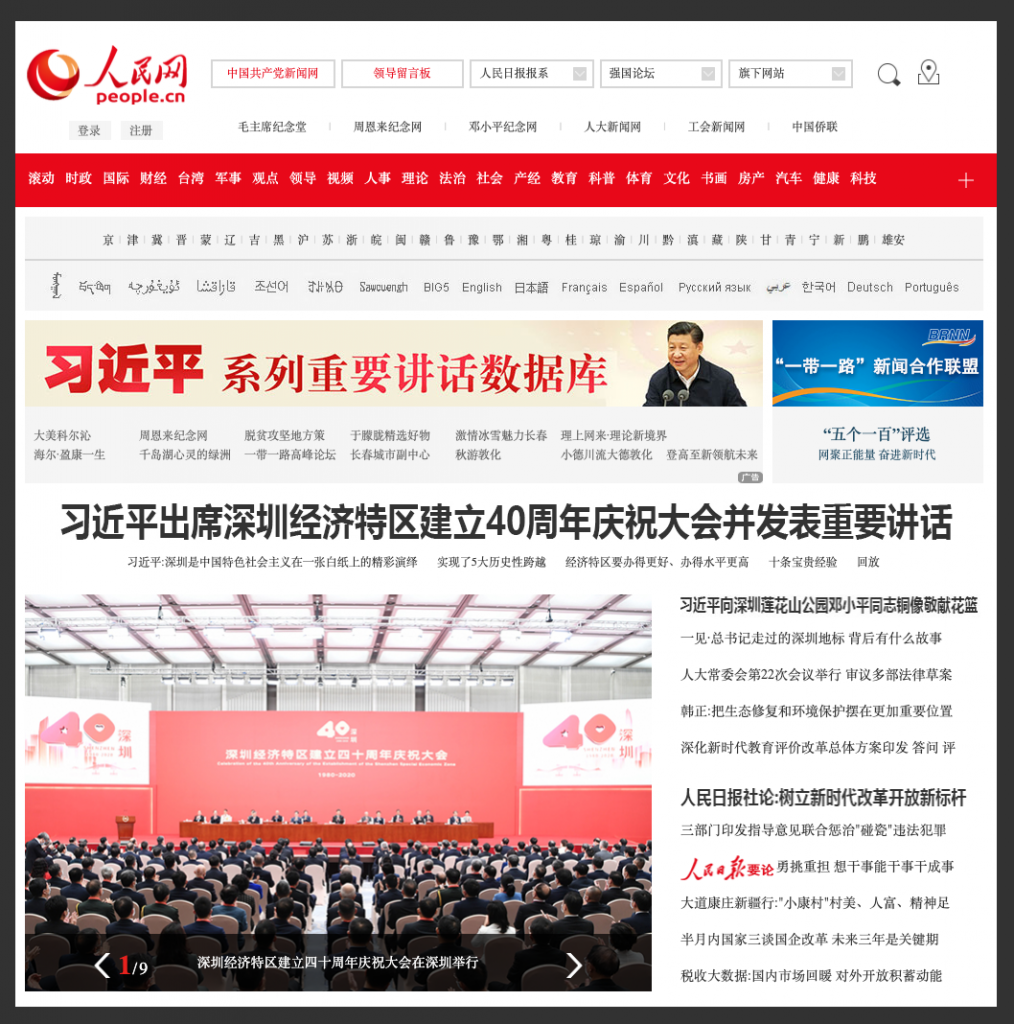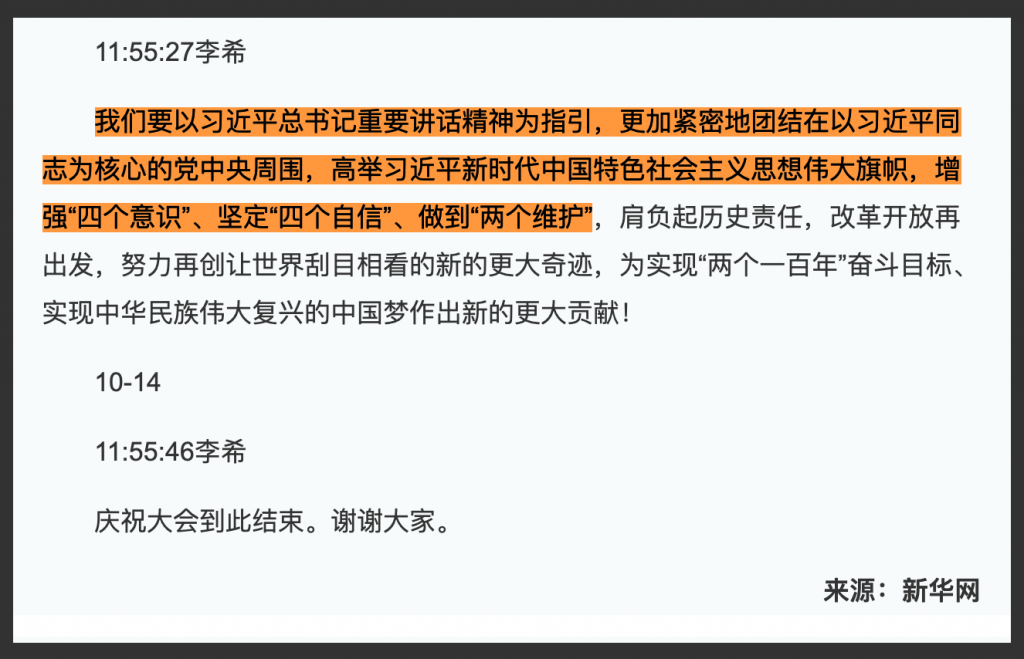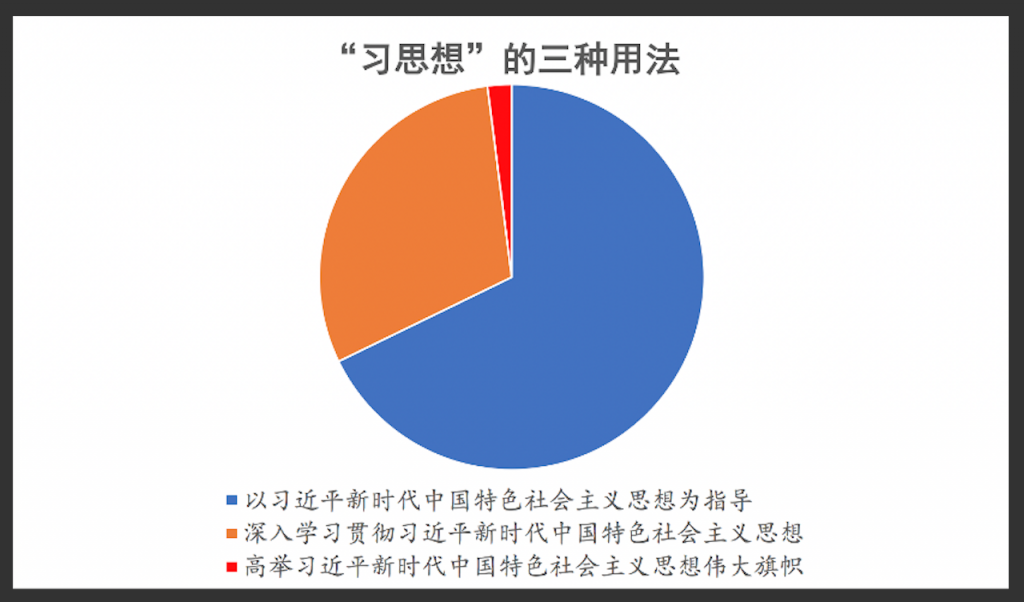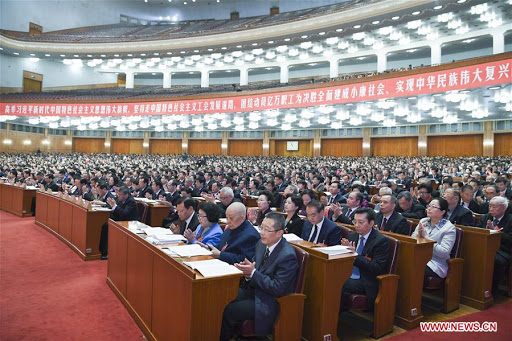China Newspeak
Raising Up the General Secretary
Today the Chinese Communist Party (CCP) celebrated the 40th anniversary of the founding of the Shenzhen Special Administrative Region (SAR), and Xi Jinping’s speech to mark the occasion now tops the news at party-state media.

A quick look through the text of Xi’s Shenzhen speech suggests little or nothing of fresh import. It is very much worth noting, however, that Guangdong’s top provincial leader, Party Secretary Li Xi (李希), talked shortly after Xi’s speech about the need for “raising high the great banner of Xi Jinping Thought on Socialism with Chinese Characteristics for the New Era” (高举习近平新时代中国特色社会主义思想伟大旗帜).

Why is this significant?
This is in fact the first time since the onset of the Covid-19 epidemic in January this year that a member of the Politburo, the elite 25 officials who oversee the CCP, has aggrandized Xi (this is what the “raising high” in this case accomplishes) in his presence with reference to his banner term. And even before January, the use of this phrase was exceptionally rare.
At the 19th National Congress of the CCP in October 2017, the phrase “great banner of Xi Jinping Thought on Socialism with Chinese Characteristics for a New Era” was introduced as a preliminary banner term – as my colleague Qian Gang has pointed out. The ultimate goal ever since, navigating the domestic and international political seas, has been for the top leadership to contract this long phrase into the five-character power-term “Xi Jinping Thought.” This is a game we’ve seen play out in a number of arenas, including most recently foreign diplomacy.
Not at all unlike the Cultural Revolution era phrase, “Raising high the great banner of Mao Zedong Thought” (高举毛泽东思想伟大红旗), once the shortening of Xi’s banner term has been successfully achieved, the phrase, “Raising high the great banner of Xi Jinping Thought” can be introduced normally into media and official discourse.
After the 19th National Congress, we already saw the emergence of “raising high the great banner of Xi Jinping Thought on Socialism with Chinese Characteristics for the New Era.” Where “Xi Thought” (习思想) is concerned, we can now find three distinct formalized phrases in the official People’s Daily newspaper:
“with Xi Jinping Thought on Socialism with Chinese Characteristics for the New Era as the guide” (以习近平新时代中国特色社会主义思想为指导);
“deeply studying and implementing Xi Jinping Thought on Socialism with Chinese Characteristics for the New Era” (深入学习贯彻习近平新时代中国特色社会主义思想);
“raising high the great banner of Xi Jinping Thought on Socialism with Chinese Characteristics for the New Era” (高举习近平新时代中国特色社会主义思想伟大旗帜).
The first has been used most frequently. The Work Regulations of the Central Committee of the Communist Party of China, released on October 13, state in Article 3 that, “The Central Committee holds high the magnificent banner of Socialism with Chinese characteristics, takes Marxism-Leninism, Mao Zedong Thought, Deng Xiaoping Theory, the important “Three Represents” thought, the scientific development concept, and Xi Jinping Thought on Socialism with Chinese Characteristics for a new era . . . . “
The second phrase has appeared less frequently, and the third even less so. Looking at the use of the three phrases in the People’s Daily from October 2017 to October 14, 2020, we find that the first has appeared in 6,121 articles, the second in 2,312, and the third in just 67.

Which members of the Politburo have used the “raising high” phrase in reference to Xi’s banner term? They are, searching the People’s Daily: Wang Chen (王晨), on November 9, 2017; Li Qiang (李强), on December 4, 2017; Chen Quanguo (陈全国), on March 8, 2018; Zhao Leji (赵乐际), on October 30, 2018; Wang Yang (汪洋), on August 30, 2019; and Han Zheng (韩正), on January 11, 2020.
At various meetings after the 19th National Congress of the CCP in 2017, the phrase appeared prominently on bright red banners unfurled at the respective venues. Examples include the 18th National Congress of the Chinese Communist Youth League, the 17th National Congress of the All-China Federation of Trade Unions (ACFTU), and the 12th National Congress of the All-China Women’s Federation.

Xi Jinping was in attendance at all three of the above-mentioned congresses, and of course he would have seen this “raising high.” Zhao Leji delivered the main address to the All-China Women’s Federation event, and that address including his own mention of “raising high.” Wang Yang’s 2019 mention came as he addressed an awards ceremony for state-owned enterprise bosses. Han Zheng’s January 2020 mention came as he spoke at a ceremony for the National Science and Technology Awards.
The “raising high” phrase appeared the most in the People’s Daily in 2018, following the 19th National Congress, with 28 articles in total using the phrase, compared to 13 in 2017 (all within two months of the National Congress), and 19 in 2019. This year, the phrase has appeared just 7 times. After all, it has been a year of many distractions.
As Qian Gang argued in his report on Chinese discourse in 2019, the lengthy “raising high” phrase must necessarily be shorted, according the CCP’s political logic, and the ultimate full-phrase goal has to be: “Raising high the great banner of Xi Jinping Thought.” Given the constant difficulties that have beset China ever since the 19th National Congress of the CCP, including domestic economic challenges, the US-China trade war, global frictions over trade, technology and human rights, the issue of Hong Kong, and so on, Xi Jinping’s ambition to seal his legacy with the stele of “Xi Jinping Thought” has been difficult to achieve.
Now, more than nine months after Han Zheng’s mention of the “raising high” phrase, we again have a member of the Politburo using the phrases to express praise and loyalty toward the General Secretary. During the live broadcast of Li Xi’s address on China Central Television, the camera cut away from Li just as he was uttering these words of high praise, a choice that could not have been incidental.
Staring straight ahead, unblinking, against a plain red background, the General Secretary was smiling.






















